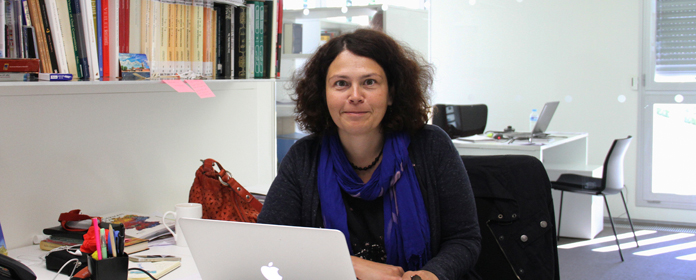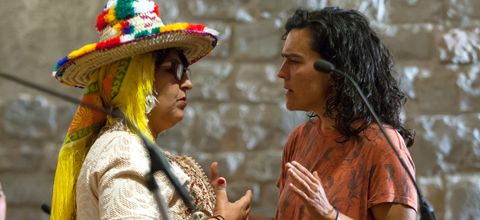"We live in the era of great changes in language."
Sarali Gintsburg has finished a research on oral creativity that she has developed thanks to a scholarship Marie Curie on the project 'Public discourse'

PHOTO: Natalia Rouzaut
Sarali Gintsburg holds a degree in Philology Arabic and programs of study Islamic from the University of Helsinki (Finland) and Master's Degree in the same specialization program from the University of St. Petersburg (Russia). She obtained her doctorate at Humanities from Tilburg University (The Netherlands). In 2017 he joined project 'Public discourse' of the Institute for Culture and Society (ICS) of the University of Navarra thanks to a scholarship Marie Curie, the most competitive call of the European Commission. Her research, which ends in the academic year 2018-2019, has focused on formulaic creativity in cognitive oral poetry through her project ORFORCREA (ORal, FORmulaic, CREAtivity).
What was the project ORFORCREA about?
My project was about verbal creativity. The basis of my project revolved around the question of how we might define and measure verbal creativity. Creativity is about our human skill to see the world in a new, different, unusual way. Ultimately, if human creativity is about seeing the world in a new way, verbal creativity is about self-expression or putting thoughts into words in an innovative way.
To do this, I decided to draw on my expertise as a specialist in oral literature and oral traditions and to use some recent findings from the field of cognitive science. I was not the first to do this; other researchers have used oral traditions as 'laboratories' of human language. However, those scholars were using dead traditions so they could not be entirely sure that their understanding and analysis of research was correct. For my part, I proposed to use examples from living traditions as well as traditions in transition. The latter assumes that these traditions and literatures would be analyzed as they transitioned from being purely oral to being written. This is known as transitional literature.
How many traditions have you studied?
I have researched three traditions. The oral tradition of the jbala, from Morocco; the kopla zaharrak, a tradition from the Basque Country; and the socotrí, from the island of Socotra (Yemen). I have focused on three traditions because, when you work with oral material, you need a lot of time to transcribe and analyze it.
What are the main conclusions of your research?
First, I was able to confirm some of the cognitive theories. Throughout my research I was able to show that there are Structures and general cognitive mechanisms that are the same in the different traditions. I cross-studied the oral tradition of the jbala, which is a living oral tradition, with the Basque tradition kopla zaharrak, which is now extinct. I could see that, in general, the cognitive mechanisms used by the poet's brain are very similar. I think this is the most important conclusion.
The second conclusion worth mentioning is that, although the basic mechanisms are very similar, they are embedded in their context. So, if we talk about cognitive sciences and the mechanisms involved and how it is possible to interpret them, we need to know the cultural environment of that tradition. I think this has often been ignored in research.
How do these cognitive mechanisms usually work?
To explain this, I have borrowed two concepts from the field of cognitive sciences, cognitive linguistics and cognitive psychology: the concept of framework and the concept of script. A framework is that which frames the topic and the script is the possible development of that topic. This idea was initially created and applied by the founding fathers of artificial intelligence in the late 1970s. The idea was to understand how the brain works in order to apply the results to artificial intelligence.
A very common example is the following: going to the doctor's enquiry -this is the framework. When you visit the doctor you know more or less, what is going to happen - this is the script - the doctor will ask some particular questions (what brought us to his enquiry) and the patient already knows the subject of answers he is going to give. So, if you look at oral traditions, you can see more or less the same structure.
What publications have you made during this period?
I have published three articles where I analyze these traditions through the cognitive approach . They are the following:
- Lost in dictation. A cognitive approach to oral poetry: Frames, scripts and 'unnecessary' words in the Jebli ayyu, published in 'Language and Communication' where I analyze the terms framework and script applied to my material.
- It's got some meaning but I am not sure...The role of the particle (wa)-ma in the oral and transitional poetry of the Jbala (northern Morocco) from the cognitive perspective, published in 'Pragmatics and Cognition', where also attention the Moroccan tradition.
- Identity, Place, Space, and Rhymes During a Pilgrimage to the Shrine of Moulay Abdessalam, Morocco, published in 'Journal of Religion in Africa'. In this article I analyze Moroccan poems that were recited impromptu during the pilgrimage to shrines in the region. I analyze these poems in the theoretical framework of space and time and, in addition, I link it to the question of identity, how poets identify themselves through poetry.
In addition, I have a article under review where I compare the traditions of Morocco and the Basque Country.
Could you highlight any activity developed during the project?
I am very proud of the dissemination event that we organized from the ICS and the association Mintzola Ahozko Lantegia, with the partnership of the City Council of Pamplona. We brought together two poets from two different traditions: the bertsolari Maialen Lujanbio and the ayllus singer Latifa Laaroussia.

Latifa Laaroussia and Maialen Lujanbio at the poetry recital held at Civivox Condestable (Pamplona)
We tried to organize a poetic duel so that it would not be an event exclusively for experts, but also so that the general public could follow the recital and see for themselves how it worked. In addition, after the recital, a roundtable was held where we could discuss issues related to my research and communicate directly with the poetesses.
On the framework of your research you have conducted work fieldwork in Morocco and Socotra, how has this been relevant for project?
For my project it is very important to be able to communicate with those people who create the words and with the audience. During the work fieldwork, first, I would go to contact with local artists and sit down with them to work, to record their performances. Then, I would analyze with them the text for the performance and the performance per se, what they saw in each part, what it meant... I could also question the audience, ask them how they had seen the performance, what they had understood, why they had reacted that way, why they were applauding...
I think this is very important because the problem with previous research was that you were working with dead traditions, sometimes for thousands of years, so it is not possible to know if you have understood the text correctly and you cannot ask the author. You can't ask the audience either and this is also fundamental because when we create something, we do it for someone, we have the audience in mind and the creations are meant for those people.
What are the next steps for project ORFORCREA?
I still have a lot of material to work on, at least for a couple of years, and I hope to finish writing scientific publications on all the data I have collected.
At the same time, I am working on some guidelines for a special issue of the RILCE magazine, edited at the University of Navarra, which will be entirely devoted to transitional texts, that is, those that pass from the oral to the written state. It deals with all subject of materials. For example, there is a article on the medieval Germanic Chronicles. There are also several examples of the epistolary genre, such as private correspondence from the early 20th century, which is also considered a form of literature. I will also publish a article on the oral traditions of the Basque Country, the Middle East, Africa and South America.
How do you include the epistolary genre in transitional texts? Aren't they only written?
That particular article looks at private correspondence sent by Irish emigrants who had just settled in the U.S. to their places of origin. These people barely had Education and barely knew how to write so the language they used was semi-oral semi-written. It is a combination of a very basic oral genre with writing. Anything said orally and then put on paper is in fact a transition from oral to written.
Do you think that today we are transitioning our written language to a more oral one?
This is a hotly debated topic . We tend to think that something is either oral or written, that there is nothing in between. But, in fact, if you think about it, it's a continuum because oral transitions to written and vice versa. It's very difficult to define what is oral and what is written. Nowadays there is a term called 'oralization': this is that a person is perfectly educated at language but, when writing, uses a conversational style.
Like when we write on the cell phone....
Yes, that's what I mean. I think language is going to change again. We live in the era of big changes in written language because, for many people, it's very difficult to maintain two levels in the same language. Most people don't understand, for example, where to put the commas because, as they say, even if there are no commas, "you understood me perfectly well".




